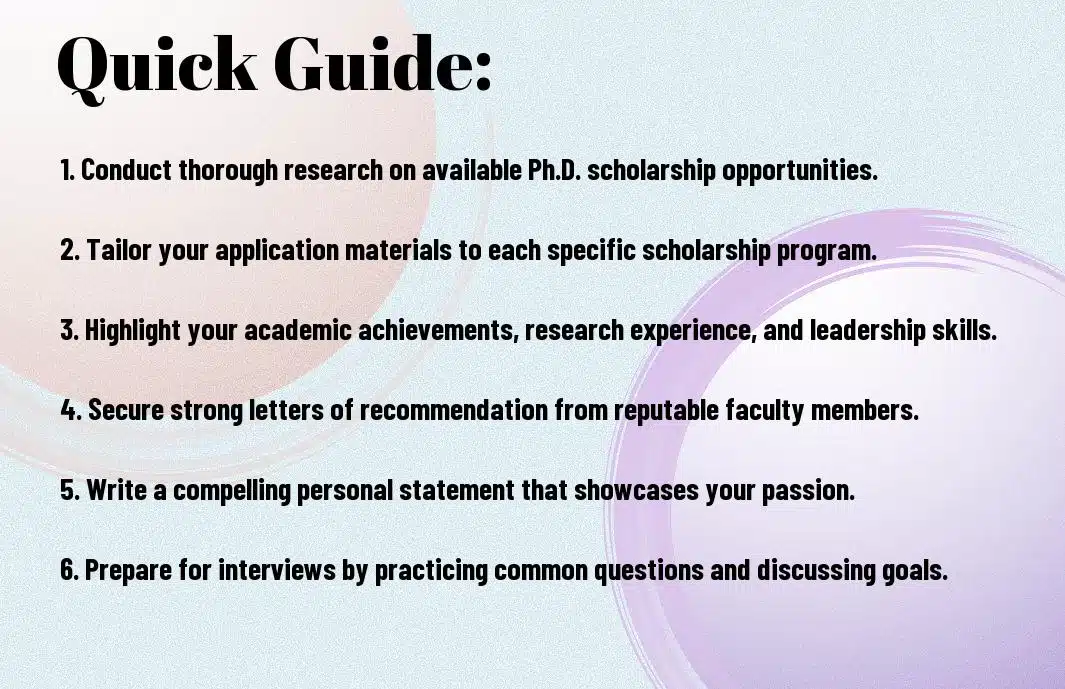This comprehensive guide offers 10 necessary tips for individuals aiming to secure a Ph.D. scholarship at a prestigious university. Navigating the competitive field of academia can be daunting, but with the right strategy and preparation, it is possible to stand out among the crowd and secure funding for your doctoral studies. By following these expert tips, you can increase your chances of successfully obtaining a Ph.D. scholarship at a top university.
Key Takeaways:
- Start early: Begin researching and preparing for Ph.D. scholarships well in advance to ensure you meet all deadlines and requirements.
- Focus on academic excellence: Universities look for candidates with a strong academic record, so make sure to maintain high grades and excel in your field of study.
- Develop a strong research proposal: A well-thought-out research proposal is crucial for securing a Ph.D. scholarship, so spend time refining and perfecting your proposal before submission.

Understanding Ph.D. Scholarships
Little is more thrilling for a prospective Ph.D. student than the opportunity to secure a scholarship that can help alleviate the financial burden of pursuing higher education.
Types of Ph.D. Scholarships
For aspiring Ph.D. candidates, understanding the various types of Ph.D. scholarships available is crucial. Whether it’s a fully funded scholarship, partial scholarship, research assistantship, or teaching assistantship, each type comes with its own set of benefits and requirements. This knowledge can help applicants tailor their applications to fit the specific criteria of each scholarship opportunity.
| Types of Ph.D. Scholarships | Description |
| Fully Funded Scholarships | Cover tuition, stipend, and other expenses |
| Partial Scholarships | Partial coverage of tuition or stipend |
| Research Assistantship | Assist faculty in research projects |
| Teaching Assistantship | Assist professors in teaching undergraduate courses |
Key Factors Affecting Scholarship Awards
Types of Ph.D. scholarships are awarded based on several key factors such as academic excellence, research experience, letters of recommendation, statement of purpose, and personal interviews. Recognizing the importance of these factors can significantly impact an applicant’s chances of securing a Ph.D. scholarship.
- Academic Excellence: High GPA and standardized test scores
- Research Experience: Previous research projects or publications
- Letters of Recommendation: Support from credible sources
- Statement of Purpose: Clear and compelling career goals
- Personal Interviews: Articulate communication skills
Recognizing the weight of these key factors affecting scholarship awards can guide applicants in preparing a strong application that highlights their strengths in these areas. Emphasizing academic achievements, research capabilities, and communication skills can make a significant difference in securing a coveted Ph.D. scholarship.
Preparing Your Application
Tips for a Standout Curriculum Vitae (CV)
Now is the time to make sure your curriculum vitae (CV) stands out among the competition. Highlight your academic achievements, research experience, publications, and any relevant internships or work experience. Use clear and concise language, and tailor your CV to the specific requirements of the scholarship you are applying for. After all, your CV is the first impression the selection committee will have of you, so make sure it reflects your dedication and potential.
Crafting a Winning Research Proposal
On your path to securing a Ph.D. scholarship, crafting a winning research proposal is crucial. To stand out, your research proposal should clearly articulate your research question, objectives, methodology, and expected outcomes. Highlight the significance of your research within your field and demonstrate your innovative approach. Be sure to outline a feasible timeline for your research and show how it aligns with the university’s research priorities. Strong research proposals often lead to successful scholarship applications.
The Application Process Step-by-Step
Keep 10 Ways to be a Good PhD Student | FindAPhD.com in mind as you initiate on the journey of applying for a Ph.D. scholarship at a top university to ensure you are well-prepared for the challenges ahead. Breaking down the application process into manageable steps can help you navigate the complex process effectively.
| Step 1: Research | Step 2: Prepare Documents |
| Thoroughly research the universities, departments, and professors relevant to your field of study. | Prepare all necessary documents, such as CV, personal statement, research proposal, and letters of recommendation. |
| Step 3: Meet Deadlines | Step 4: Seek Feedback |
| Meet all application deadlines to avoid disqualification from the selection process. | Seek feedback from professors, mentors, or advisors to improve the quality of your application materials. |
Where to Look for Ph.D. Scholarship Opportunities
Even before starting the application process, it’s imperative to explore various sources for Ph.D. scholarship opportunities. Look into university websites, funding databases, academic research portals, and specific scholarship programs to identify potential funding options that match your research interests.
How to Tailor Your Application for Different Scholarships
StepbyStep, you should tailor your application for different scholarships by carefully reading and understanding the specific requirements and selection criteria of each scholarship. Tailor your CV, personal statement, and research proposal to highlight your qualifications, research goals, and alignment with the scholarship’s values and objectives.
Tailor your application by emphasizing relevant experience, achievements, and skills that align with the scholarship’s focus areas. Make sure to showcase your passion for research and the potential impact of your proposed study to stand out among other applicants.
The Interview Stage
Pros and Cons of Various Interview Formats
Despite the challenging nature of the interview stage when applying for a Ph.D. scholarship, understanding the various interview formats can better prepare you for what lies ahead.
| Format | Pros and Cons |
| One-on-One Interviews | Pros: Allows for personalized interaction. Cons: Limited perspectives. |
| Panel Interviews | Pros: Diverse viewpoints. Cons: Intimidating for some applicants. |
| Virtual Interviews | Pros: Convenience. Cons: Limited non-verbal communication cues. |
Essential Interview Tips for Success
While preparing for the interview stage, there are critical tips to keep in mind to increase your chances of securing a Ph.D. scholarship.
- Research the interviewer and their work beforehand.
- Practice answering common interview questions.
- Prepare questions to ask the interview panel.
Interviews are pivotal in the Ph.D. scholarship application process. Preparation is key to successfully navigating this stage and showcasing your qualifications.
Making the Most of the Ph.D. Experience
Balancing Research with Scholarship Obligations
Many Ph.D. students struggle to balance their research work with their scholarship obligations. It is crucial to manage time effectively and prioritize tasks to meet both academic and scholarship requirements. By developing a clear schedule and setting achievable goals, students can navigate through their Ph.D. journey successfully.
Networking and Professional Development
The importance of networking and professional development cannot be overstated in the Ph.D. experience. Networking helps students build connections within their field, leading to potential collaborations, job opportunities, and increased visibility. Attending conferences, seminars, and workshops can enhance one’s knowledge and professional skills, ultimately contributing to a well-rounded Ph.D. journey.
Networking with peers, professors, and professionals in the field can also provide invaluable insights, mentorship, and support throughout the Ph.D. process. Building strong relationships and a professional network can open doors to future projects, collaborations, and career opportunities. Therefore, it is important for Ph.D. students to actively engage in networking activities and prioritize professional development to make the most of their academic experience.
Financial Considerations
Understanding the Full Scope of Ph.D. Scholarship Funding
With the increasing competition for Ph.D. scholarships, it is crucial to understand the full scope of funding available. Scholarships may cover tuition fees, living expenses, research costs, and sometimes even conference travel. It is crucial to thoroughly research and apply for all possible scholarships to maximize your financial support.
Planning for Expenses Beyond the Scholarship
To ensure a worry-free Ph.D. journey, it is crucial to plan for expenses beyond the scholarship. Unexpected costs such as health insurance, visa fees, books, and materials can add up quickly. Creating a detailed budget and researching additional funding opportunities such as part-time work, grants, or loans can help cover these expenses.
Financial planning is key to successfully navigating the financial aspect of a Ph.D. program. It is important to have a clear understanding of the scholarship terms and benefits, as well as any additional expenses that may arise during your studies. Keeping track of your finances, exploring different funding options, and seeking guidance from financial advisors can help alleviate any financial stress and allow you to focus on your research and academic pursuits.
Final Words
Summing up, securing a Ph.D. scholarship at a top university is a challenging but achievable goal. By following the ten tips outlined in this guide, you can increase your chances of success and position yourself as a strong candidate. From conducting thorough research to developing a compelling application, each step is important in demonstrating your determination and qualifications to the selection committee. Remember to stay organized, focused, and dedicated throughout the process, and don’t hesitate to seek guidance from mentors or professionals in the field. With perseverance and a well-executed strategy, you can land a Ph.D. scholarship at a top university and begin on an enriching academic journey towards your research goals.
Also Read : How To Stand Out In Your Ph.D. Scholarship Application
FAQs
Q: What is the importance of landing a Ph.D. scholarship at a top university?
A: Securing a Ph.D. scholarship at a top university is important for many reasons. It not only provides financial support for your research but also offers opportunities for networking, access to top-notch resources, and prestige that can enhance your academic and professional career.
Q: How can I increase my chances of getting a Ph.D. scholarship at a top university?
A: To improve your chances of landing a Ph.D. scholarship at a top university, you should focus on building a strong academic record, engaging in relevant research activities, cultivating relationships with potential supervisors, tailoring your application to each program, and showcasing your passion and dedication for your field of study.
Q: What are some common mistakes to avoid when applying for a Ph.D. scholarship?
A: When applying for a Ph.D. scholarship, avoid common mistakes such as submitting a generic application, neglecting to thoroughly research the university and program, failing to meet all the application requirements, missing deadlines, and not seeking feedback on your application materials. Additionally, it’s crucial to demonstrate a clear alignment between your research interests and the expertise of potential supervisors.





